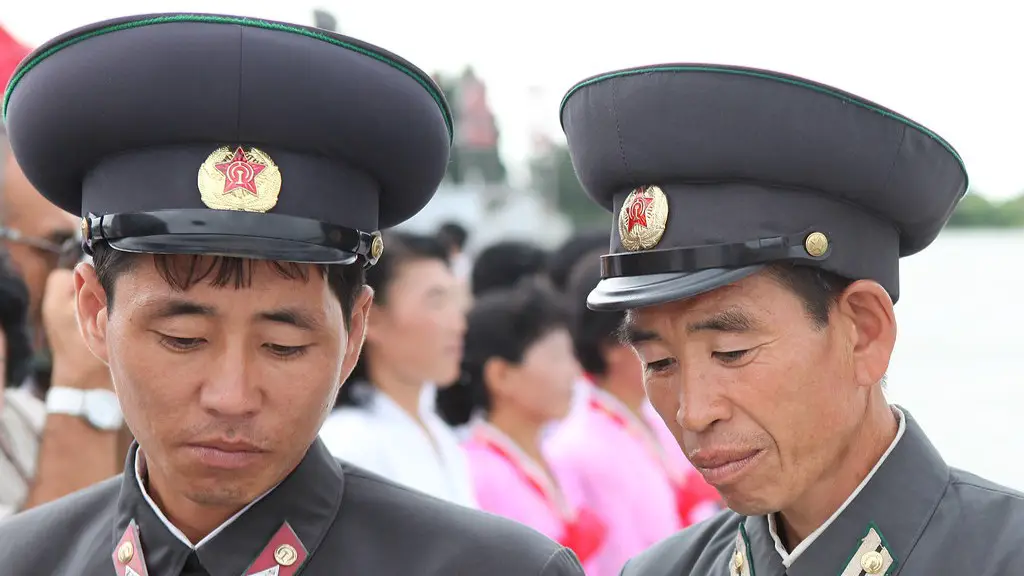What Rules Do North Korea Have
North Korea, officially the Democratic People’s Republic of Korea (DPRK), is one of the world’s most isolated countries, and its rulers are often accused of enforcing draconian rules, restrictions and punishments on its citizens. The exact nature of these rules and restrictions is largely kept out of the public eye. In recent years, the world has begun to learn more about what life is really like inside the country and the rules that are imposed on its citizens.
From a legal perspective, North Korea is considered a “hardline” communist state. It’s officially ruled by the values of Confucianism and socialism, and it currently has a Constitution, however analysts question its practical effectiveness given the lack of internal democracy in the country. Under the Constitution, the North Korean people supposedly enjoy certain rights and liberties, although in reality these are not always respected.
The government of North Korea has also been accused of using tactics of extreme repression, utilizing surveillance networks and secret police to enforce obedience. It has been documented that various groups and individuals have been subject to severe and sometimes fatal punishment for minor infractions. The most serious offenders or political dissidents are often put into prison camps known as “Kwanliso” where cruel treatment is documented.
One of the most prominent rules enforced in North Korea is that citizens must always show absolute loyalty to the ‘Supreme Leader’, Kim Jong-un, who is also the current leader of the Workers’ Party of Korea. The state uses various propaganda tools to ensure that Kim’s rule and ideology are accepted by all citizens. This includes the glorification of leadership in state media, a strong nationalist message, along with entertainment and cultural events to bolster support.
A lack of freedom of movement is also a major rule in North Korea. Citizens are forbidden from travelling abroad without the state’s permission and must abide by certain restrictions when travelling within the country. Other rules include the regulation of certain aspects of one’s personal life, such as clothing and hairstyles, as well as what is deemed acceptable speech and behaviour. Education, even in the form of books and literature, is highly regulated, and only material that is approved by the state is allowed to be read by citizens.
Access to media and the internet are very limited in North Korea. Although some citizens do have access to the internet in their homes, the government heavily restricts what information is available. Social media platforms, foreign television and radio broadcasts, foreign news outlets, and any other content not approved by the state are strictly forbidden.
Another restriction of everyday life in North Korea that must be followed by citizens is the regulation of public events and gatherings. Political events, public protests, or other activities that do not have state approval are strictly forbidden and can result in severe consequences for those in attendance.
Currency
One unique rule in the North Korean system is the strict controls on the use of currency. The North Korean government limits how much money each citizen can possess, and a market exchange rate is in place to monitor transactions. Money must be exchanged through government-run banks, and taxes must be paid in national currency, the ‘won’. The government also limits the amount of foreign currency citizens can possess and has been known to confiscate foreign currency from travellers and citizens alike.
The North Korean system of currency control has been termed draconian by outside observers, as the government imposes strict punishments on anyone found to be in possession of too much money or foreign currency. In some cases, individuals have been sentenced to prison labour camps or even execution for violating the rule.
Transportation and Communication
Transportation and communication are heavily regulated in North Korea. All landline and cellular communications go through the state-owned telecommunications provider, and only approved users are allowed to access the internet. Only citizens above a certain level of societal standing are permitted to own motor vehicles, and even then, they must obtain a special permit from the state.
Public transportation is provided in the form of buses and taxis that are owned and operated by the state. Passengers are usually required to provide IDs and tickets before boarding. Travellers are also monitored, and anyone deemed to have violated rules can be turned over to the police or military for punishment.
Military Service
Military service is a requirement for all young North Korean males. When they reach the age of 18, they must enlist in the military and serve for at least 10 years. Citizens are forbidden from leaving the country during this period and must follow various military rules. Those who attempt to desert or deserting military personnel can face execution or imprisonment.
Media Links
The Western media is mostly banned in North Korea. Foreign media outlets are seen as a threat to the North Korean regime and any material considered “subversive” is blocked. North Korean citizens without access to the internet are limited to state-run newspapers, radio, and television channels. Accessing and distributing foreign media is illegal and punishable by law.
Free and Fair Elections
Although the North Korean government holds elections and claims them to be free and fair, international observers have long said that the polls are neither free nor fair. Reports have found that state-backed political groups have a monopoly on the political power, and citizens have no real choice in the matter. In addition, political prisoners and anyone deemed to be a threat to the regime are usually excluded from the voting process.
Religious Freedom
Religious freedom in North Korea is practically non-existent, with citizens not allowed to practice any religion other than the officially sanctioned Catholicism and Buddhism. Any religious activity outside of a recognized church is not tolerated and can result in imprisonment or deportation. It is also illegal for members of the military to practice any faith, with such activities seen as a threat to the state.
Gender Equality
Gender equality is not widely embraced in North Korea. Men are expected to hold positions of power and leadership whilst women are seen mostly only in subordinate roles. Domestic violence and other forms of discrimination are not uncommon in the country. Likewise, LGBT rights are non-existent and those suspected of being homosexual can face imprisonment or even death.
Education
The government of North Korea requires all citizens to undertake compulsory schooling, starting at the age of six. A heavy emphasis is placed on political education, with state-run media and education promoting the values of the ruling party and leadership. Citizens must also agree to follow rules of conduct and participate in propaganda events such as soldiers’ parades and public rallies.
Conclusion
North Korea is a country that is ruled by strict rules and regulations, some of which are considered oppressive and cruel by outside observers. It has been argued that the North Korean system of rules is heavily enforced by a lack of internal democracy, militarized control of the border, and totalitarian propaganda. North Korean citizens face restrictions on their movement, communication, religion, gender, and education, with violations of these rules being punished severely. While the outside world may never know the true extent of the rules and restrictions that exist inside the country, it is clear that North Korea is a nation ruled by an oppressive and draconian system.


